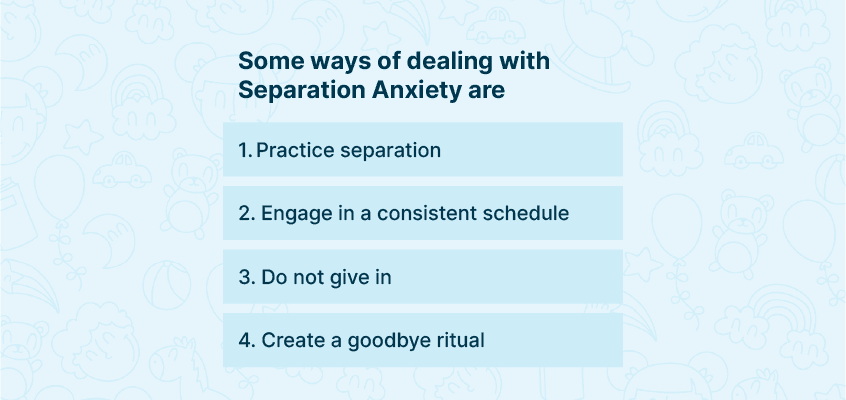Introduction
Everyone has experienced anxiety at the prospect of parting ways with a close one in their childhood or even later in life, albeit temporarily. While children naturally get used to it, some have more problems than others, fuelled by an inability to understand its impermanence or irrational fear of abandonment.
Our Wellness Programs
What is Separation Anxiety?
The definition of Separation Anxiety is excessive worrying resulting from separation from a person(s) or even a pet. While most commonly seen in toddlers and infants, it can also present in adults, especially parents. Separation anxiety is normal but classified as Separation Anxiety Disorder depending on its intensity and the level at which it hinders the sufferer’s daily activities. This anxiety may also indicate an underlying mental health condition, including but not limited to delusions as a consequence of psychosis or a fear of change suggestive of an autism spectrum disorder.

Looking for services related to this subject? Get in touch with these experts today!!
Experts

Kirti Bajpai

India
Psychologist
Experience: 5 years

Mansi Chawla

India
Psychologist
Experience: 12 years

Sapna Zarwal

India
Psychologist
Experience: 19 years

Davis Emerson

India
Psychologist
Experience: 6 years

Vasudha Agarwal

India
Psychologist
Experience: 13 years
What Causes Separation Anxiety?
Understanding the possible causes of Separation Anxiety can help you get closer to making your child feel better. Review if there’s anything in your child’s life that makes them feel threatened or uncomfortable, upsets their schedule, or throws their world into turmoil. The most common causes of Separation Anxiety include:
- Increase in stress
- Changes in the environment
- Insecurities
- Overprotectiveness of parents, which in turn makes the kid anxious
How to deal with Separation Anxiety?
Some ways of dealing with Separation Anxiety are as follows-
- Practice separation.
Let the child get used to separation by leaving them with other caregivers. Start by keeping the time and distance of separation as little as possible, and gradually increase them as things get more comfortable.
- Engage in a consistent schedule.
Make sure your separations are scheduled and at the same time each day to avoid inconsistency due to unexpected factors. Engaging in a consistent routine will help mitigate anxiety and anguish whilst promoting independence and developing trust.
- Do not give in.
It may be unpleasant seeing your child suffer when you can easily prevent it, but breaking set patterns by establishing contact during separation can undo all progress on this front. Instead, setting consistent limits and staying committed to them will help your child adjust to separation.
- Create a goodbye ritual.
Simple goodbye rituals with your child can offset some stress caused by parting. They make them feel special and help by acting as a distraction. Make sure to keep your goodbyes sweet and short because lingering will only increase the transition time, which leads to more anguish.
- Follow through on your promise of return.
Your promise that you will reunite on time is far more valuable for your children than it may be for you. Returning on time is an essential step in developing trust and confidence in your child, as it helps them believe that the separation is temporary and manageable.
- Be attentive and specific.
Giving the child your full attention during separation is imperative, as it helps build confidence. Try being as specific about the timing of your return and helping them understand that you will be back soon. (E.g. I will be back when nap time is over.)
- Try to avoid unfamiliar surroundings.
Let the child get used to unknown people (such as a new sitter) in a familiar surrounding like your home. Building a rapport with the kid will help the sitter deal with their issues in an unknown setting. If unavoidable, encourage the child to carry a familiar object along when being away from home.
- Being educated and aware of the situation.
As an adult, it is often tough to relate to your child’s feelings and, no matter how much you want to, it is only natural to feel a sense of disconnect. Learning about your child’s experiences and their reasons for feeling these emotions is crucial for empathising with their struggles.
- Be understanding and respectful of your ward’s feelings.
Children who are already going through these experiences typically feel lonely and isolated. Having an understanding adult who respects their feelings and makes them feel heard can have a robust healing effect and help counteract the results of that isolation.
- Talk about the issue.
Letting your child know that their feelings are not only reasonable but natural can go a long way in helping them address and deal with them. Not only does it promote a healthy habit of ‘talking about feelings’ in children, but it also helps them get used to new perspectives and might instil a problem-solving attitude in them.
- Keep calm during separation.
It is normal to feel anxious letting your child go under someone else’s care, but you must act like an adult in the situation. While your feelings might be natural, you have a responsibility to stay calm during separation, so your child can get used to it. Not to mention, your child is likely to imitate your behaviour, which can help curb this anxiety in them.
- Praise your child’s efforts.
Even if small, you should validate your child after healthy behaviour like not acting up after separation, which can lead to positive reinforcement and help them overcome their issues and develop their self-esteem.
- Offer choices.
Letting your child have a choice or some element of control in their interactions with you and others concerning separation can help them feel safer and more independent. If your kid gets to choose your drop-off spot for preschool or the toy they get to carry to daycare, they are bound to feel more secure and independent.
- Help your child interact with others.
Interacting and bonding with other people such as teachers, counsellors or peers might help the child become less dependent on you and consequently less anxious when parting ways.
Separation Anxiety Disorder is the presence of long-term anxiety, and it affects daily activities and development while causing significant distress. It is treated primarily via psychotherapy by a mental health professional, but treatment may also include–
- Talk Therapy
It is essentially the provision of a safe space where your child can express their feelings and emotions. Having a mental health professional to listen and help guide the child in understanding their anxiety can be beneficial.
- Play Therapy
Using play as a therapeutic tool often helps children open up and express themselves in a better and more effective way, which can eventually help in healing the child.
- Family Counselling
Undergoing counselling as a family can help as it views your problems collectively. It can help your child counteract the thoughts that cause anxiety, and you can personally assist your child in developing coping skills.
- Medication
In extreme circumstances, your doctor might prescribe anti-anxiety medication to treat some of the disorder’s acute symptoms. It is important to note that using medicine to treat Separation Anxiety is temporary and must always be done in conjunction with psychotherapy.
Resources for Dealing with Separation Anxiety
You can refer to the links mentioned below to better understand this anxiety and also for treatment and management options :
https://test.unitedwecare.com/services/mental-health-professionals-india
https://www.helpguide.org/articles/anxiety/separation-anxiety-and-separation-anxiety-disorder.htm
https://www.goodtherapy.org/blog/for-parents-how-to-navigate-your-childs-separation-anxiety-0121207
https://www.mentallyhealthyschools.org.uk/resources/separation-anxiety-tools-for-teachers/
https://childmind.org/guide/quick-guide-to-separation-anxiety-disorder/
Conclusion
While most commonly present in children, Separation Anxiety can prevail throughout all demographics, as previously iterated. Coping with it is an arduous experience for everyone. It is necessary to realise the importance of patience and persistence when dealing with it and people experiencing it. Understanding their situation with an open mind is essential to ease their anxiety.
UnitedWeCare specialises in dealing with situations like these, among others, which you can find here.


 Conflict Management in Relationships
Conflict Management in Relationships
 Healing from Heartbreak
Healing from Heartbreak Coping With Anxiety
Coping With Anxiety Get Started With Mindfulness
Get Started With Mindfulness






